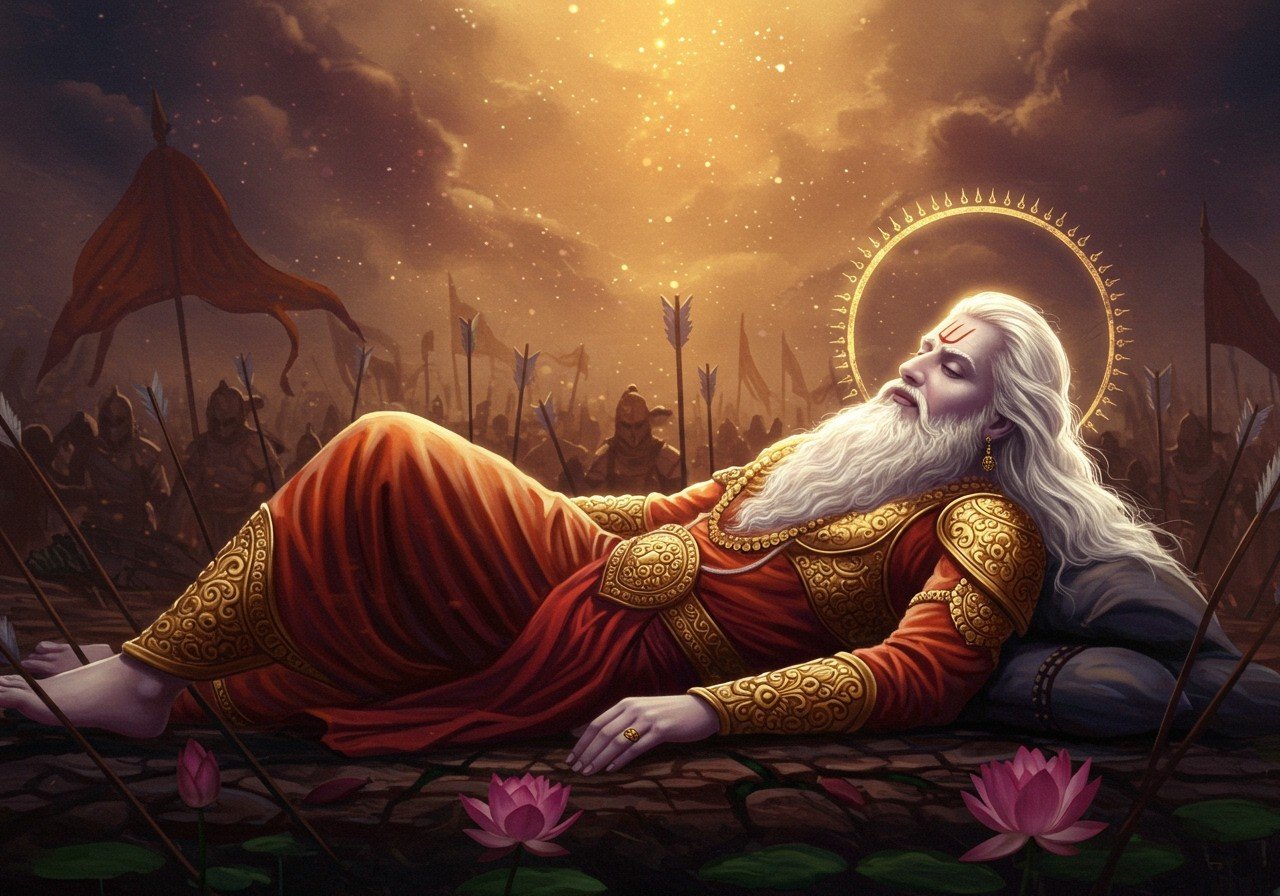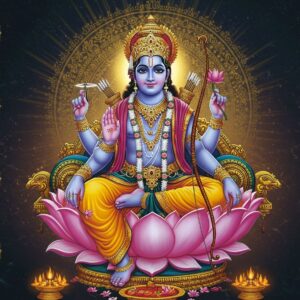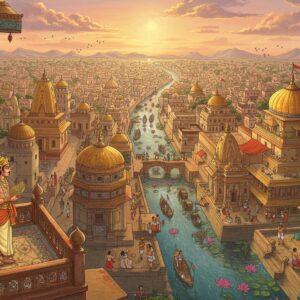
Bhishma Pitamaha, a revered figure in the Mahabharata, stands as a testament to dharma and sacrifice. His life, interwoven with the boon of Iccha Mrityu, or self-willed death, offers profound insights into ancient Indian values and beliefs. Let’s delve into this compelling narrative of honor, duty, and spiritual strength.
The Genesis of a Boon
Bhishma, born Devavrata, received this extraordinary boon from his father, King Shantanu. It was a poignant reward for a sacrifice of immense magnitude – a vow of lifelong celibacy and the renunciation of his claim to the throne. This selfless act paved the way for Shantanu’s marriage to Satyavati, whose father stipulated that only her offspring would inherit the kingdom. Devavrata’s profound commitment earned him the name Bhishma, “the one with a terrible vow”, signifying the gravity of his promise. This story emphasizes the importance of duty and honor in ancient Indian culture.
For those seeking to enhance their spiritual journey, Poojn.in offers a beautiful Bengali version of the Srimad Bhagavad Gita, a timeless source of wisdom.

The Profound Significance of Iccha Mrityu
Iccha Mrityu empowered Bhishma to choose his time of departure from this mortal realm. This power reflects the high value placed on individual autonomy and control over one’s destiny in ancient Indian thought. Bhishma’s decision to postpone his death until the auspicious time of Uttarayan demonstrates not only his strategic acumen but also his deep-rooted adherence to dharma, righteousness. This boon was more than a mere ability; it symbolized spiritual fortitude and self-mastery.
Uttarayan: The Chosen Hour
Bhishma chose Uttarayan, the period when the sun commences its northward journey, as his time of passing. In Hindu tradition, Uttarayan is deeply auspicious, a time believed to facilitate the soul’s journey towards moksha, liberation from the cycle of rebirth. Bhishma’s decision reflects a profound understanding and acceptance of the spiritual dimensions of life and death, aligning his final moments with cosmic harmony. His wait for Uttarayan symbolizes the cultural emphasis on selecting the right moment for important life events.
Just as Bhishma valued auspicious timings, we at Poojn.in offer a wide range of Red Pola Bangles, perfect for adding traditional significance to your ceremonies. 
The Bed of Arrows: A Symbol of Sacrifice
During the Kurukshetra war, Bhishma, pierced by Arjuna’s arrows, lay on a bed formed by the very shafts that brought him down. This poignant image embodies his unwavering commitment to his duty and his principles as a warrior. The bed of arrows became a symbol of his resilience, his stoicism, and the sacrifices inherent in upholding dharma. It serves as a powerful reminder of the physical and emotional hardships one endures on the path of righteousness.
At Poojn.in, we offer authentic Shola malas, traditionally used in prayers and rituals, to deepen your connection with your spiritual practice. 
Bhishma’s Legacy: An Enduring Inspiration
Bhishma’s life transcends the boundaries of a mere epic narrative; it becomes a source of profound wisdom, a testament to unwavering duty and self-sacrifice. The boon of Iccha Mrityu was not just a power; it was an affirmation of his spiritual stature, his unwavering commitment to dharma, and his remarkable ability to choose his destiny. His story continues to resonate through generations, urging us to contemplate the balance between our personal desires and our responsibilities to the world, reminding us that true strength lies in righteousness, sacrifice, and adherence to our principles.
Understanding Bhishma’s Iccha Mrityu
Who granted Bhishma the boon? King Shantanu, Bhishma’s father, bestowed upon him the boon of Iccha Mrityu. This was a gesture of deep gratitude for Bhishma’s selfless vow of celibacy and renunciation of the throne.
What exactly is Iccha Mrityu? Iccha Mrityu, meaning “self-willed death,” granted Bhishma the extraordinary ability to choose the time of his passing. This unique power reflects ancient Indian beliefs regarding individual autonomy and control over one’s destiny.
Why did Bhishma choose to wait for Uttarayan? Uttarayan holds profound spiritual significance in Hindu tradition. It marks the sun’s northward movement and is believed to be an auspicious time for the soul’s transition. Bhishma chose this time to ensure a favorable passage towards moksha, liberation from the cycle of rebirth.
How did Bhishma end up on a bed of arrows? In the Kurukshetra war, Arjuna, guided by Krishna, showered Bhishma with arrows. These arrows, rather than killing him instantly, formed a bed upon which he lay until the arrival of Uttarayan, upholding his dharma even in his final moments. This symbolizes his unwavering commitment to duty and principles. Learn more about Jyotisar, the birthplace of the Bhagavad Gita, in this insightful blog post.
What was Bhishma’s role in the Mahabharata? Bhishma played a pivotal role as the patriarch and protector of the Kuru dynasty. His wisdom, unwavering commitment to dharma, and martial prowess deeply influenced the course of the epic. He is remembered for his adherence to duty, even at great personal cost.
Why did Bhishma take a vow of celibacy? Bhishma’s vow stemmed from his desire to ensure his father’s happiness and secure the throne for Satyavati’s children. This act of profound self-sacrifice reveals the depth of his devotion and the high value placed on duty and honor in ancient Indian culture.
What can we learn from Bhishma’s Iccha Mrityu? Bhishma’s story holds valuable lessons about the importance of self-control, duty, and living a life guided by principles. It highlights the significance of aligning our choices with righteousness and the belief in the cyclical nature of life and death in Hindu philosophy. Explore more on Jyotisar Sarovar in this blog post.


